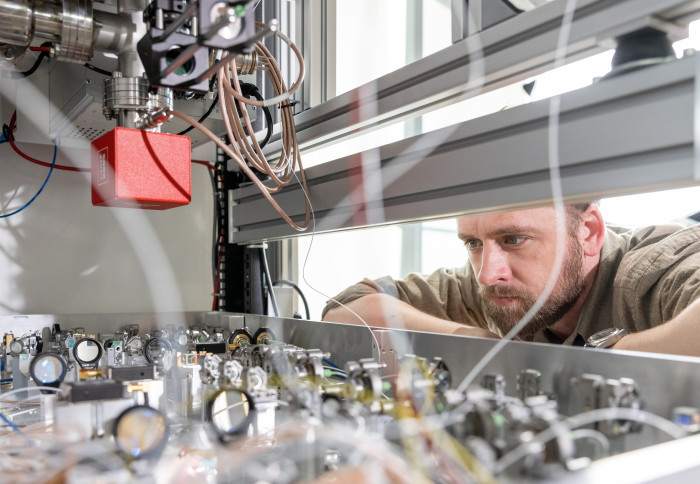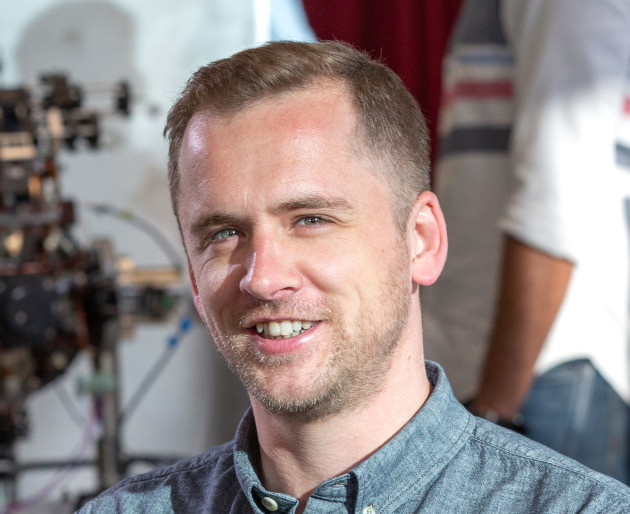Two outstanding researchers awarded quantum technology fellowships

Dr Joseph Cotter and the UK's first commercial quantum accelerometer for navigation.
Dr Joseph Cotter and Dr Max Attwood have been awarded fellowships funded by the Engineering and Physical Sciences Research Council (EPSRC).
The Quantum Technology Career Development Fellowships will enable both researchers to develop independent research careers in quantum technology. Quantum technologies exploit the quantum advantages of matter and light to achieve technological advances.
Dr Joseph Cotter: Quantum physics for improved navigation

Our society relies heavily on Global Navigation Satellite Systems (GNSS), like GPS, to enable the supply lines that underpin our economy, move people and goods around in unfamiliar places, and support our emergency services and military.
However, Global Navigation Satellite Systems aren't a fail-safe system. They can't work underground or underwater, and it can be vulnerable to local weather conditions, spoofing and being blocked.
To overcome the vulnerabilities and limitations of GNSS, Dr Joseph Cotter, Advanced Research Fellow in the Department of Physics, is developing a new technology that will harness quantum physics to determine a vehicle's position without the need to send or receive signals to someone else. Therefore, instead of using a network of satellites orbiting the earth to navigate, Dr Cotter plans to use electron orbitals in clouds of atoms that can be carried by the vehicle in a self-contained package.
This system will operate by using a combination of magnetic fields, and laser light clouds of rubidium atoms cooled close to absolute zero. The atoms are then released into free fall so that they can accelerate or rotate freely relative to the vehicle carrying them. A pulse of laser light will split each atom into two quantum waves which move apart until a second pulse reverses their direction, forcing the two parts back together. A third laser pulse allows these waves to recombine and form an interferometer.
From this, highly accurate measurements of the vehicle's motion can be made by carefully measuring the quantum state of the atoms after the interferometer. By tracking this motion over time, the vehicle's position can be determined without any external communications.
Dr Max Attwood: Next-generation maser devices
 The future of many quantum technologies could hinge on the ability to detect single microwave signal photons that convey “quantum information”.
The future of many quantum technologies could hinge on the ability to detect single microwave signal photons that convey “quantum information”.
However, the development of these technologies is currently hindered by noise photons, which originate from random microwave emissions from any thermally warm object. This noise interferes with microwave-based quantum technologies rendering them unreliable without first cooling the system to near absolute zero.
A recently revitalised class of chemical-based ultralow noise microwave amplifiers could have the ability to selectively detect our signal photons through a process of microwave amplification by stimulated emission of radiation (maser).
This fellowship will allow me to cultivate all aspects of my growth as an independent researcher with a scientific focus on developing really exciting quantum technology. Dr Max Attwood
Dr Max Attwood is a Research Associate in the Department of Materials. His project aims to chemically synthesise a new generation of organic maser materials that could make maser devices more powerful and less strenuous to operate.
Next-generation maser devices may eliminate unwanted noise photons before signal amplification and detection, allowing researchers to construct reliable room temperature quantum devices, such as sensors.
Therefore, Dr Attwood's research aims to create a series of maser materials to act as signal microwave photon sensors over a range of microwave frequencies in future quantum technologies.
Dr Attwood commented: "I am so thrilled to have been awarded the UKRI quantum technology career development fellowship. It is the perfect programme that will allow me to cultivate all aspects of my growth as an independent researcher with a scientific focus on developing really exciting quantum technology."
Article supporters
Article text (excluding photos or graphics) © Imperial College London.
Photos and graphics subject to third party copyright used with permission or © Imperial College London.
Reporter
Kayleigh Brewer
Department of Materials
